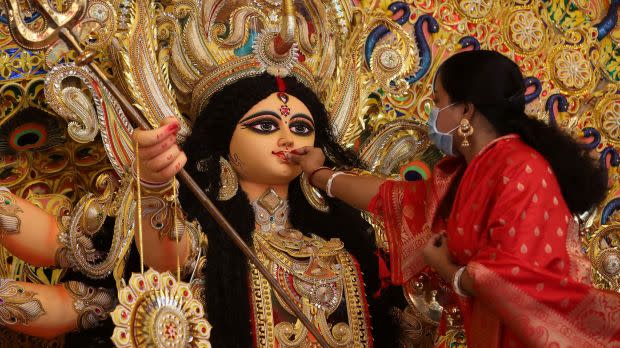India’s second wave of Covid-19 may have protected it from a devastating third wave

If India staves off a third wave of Covid-19, which now looks increasingly possible, it may have a lot to do with the deadly second wave.
In contrast to the daily numbers of over 400,000 in April and May, there were only around 13,000 new infections on Oct. 18, the lowest in 231 days.
“There would be a mild spike in cases as a result of the festive season, perhaps building up to a gentle peak, but not approaching anywhere near the size of the second wave,” said Gautam Menon, professor at the departments of physics and biology at Ashoka University.
One factor that led to the predictions of an imminent third wave was India’s August-November festival season when, traditionally, major crowds gather not only at places of worship but also as part of public celebrations.
However, a nationwide adoption of masks has, among other reasons, kept infections in check. “This, and related non-pharmaceutical interventions, including restrictions imposed by states and the centre, should tide us over,” Menon said.
Another mitigating factor was significant number of people being vaccinated in large metropolitan cities, including over 90% coverage in Delhi and Mumbai.
What may be the most important factor yet is the highly transmissible delta variant that fuelled the second wave.
Vaccines and past delta variant infections
India’s second wave of Covid-19 brought the country’s healthcare system to its knees. Delta variant infections, which are believed to spread at least twice as fast as the older ones, impacted entire communities.
There was an acute shortage of drugs, hospital beds, and oxygen cylinders. Thousands died due to a lack of timely medical care and crematoriums worked overtime.
Survivors of that phase, however, may now be better placed.
By July, nearly 70% of Indians over the age of six were found to have antibodies for Covid-19, according to the government’s seroprevalence survey. In states like Bihar, Rajasthan, and Madhya Pradesh, it crossed 75%.
While being infected once is not necessarily a permanent shield against re-infection—it is also unclear how long such immunity lasts—it does help.
“Everyone’s immunity will not wane at the same rate and prior infection followed by vaccination should yield better and potentially longer-lasting immunity. I am optimistic,” Menon said. This, beyond vaccination, had been a dominant factor in preventing a huge second-wave spike so far, according to him.
That is not to say that the festival season has had no impact. In Kolkata, for instance, which celebrated Durga Puja between Oct. 11 and 15, the Covid test positivity rate crossed 2% during that week. For context, the approximate figures for Delhi and Mumbai were 0.07% and 0.02%, respectively, in the same period.
But scientists are keeping their faith.
Once India achieves a high threshold of fully vaccinated people, too, it must begin to separate mild and asymptomatic infections from the total number of Covid-19 cases.
Breakthrough and mild Covid-19 infections
A key indicator of vaccine efficacy is the number of severe cases needing hospitalisation or leading to death. India does not publish segregated data on these or on vaccinated people getting Covid-19.
The total case count may, in fact, miss several mild or asymptomatic cases as is expected with those who are either vaccinated or in instances of reinfection.
“What should concern us is what fraction of those vaccinated wind up in hospital following a vaccine breakthrough,” Menon said. This, according to him, will be the real pointer to waning immunity leading to a potential rise in cases and then a third wave.
Sign up for the Quartz Daily Brief, our free daily newsletter with the world’s most important and interesting news.
More stories from Quartz:
Xi Jinping’s vision for China does not involve workers “lying flat”
Apple has broken up with Intel—but Intel wants to get back together
